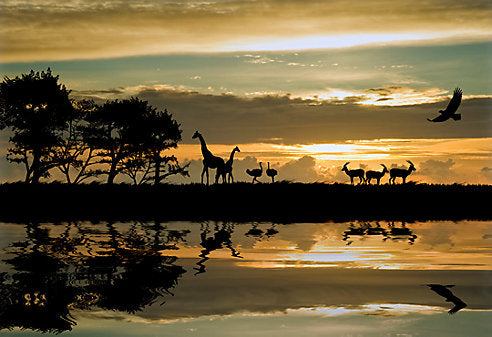How to Plan a Budget-Friendly Safari

Always longed to go on safari--but low on funds? Stop dreaming! Find out how to organize your own African safari on the cheap!
Going on safari ranks right up there as one of the top travel adventures of a lifetime, but it’s often one of the most expensive. Some of the more luxurious safari trips can easily cost $1,000-2,000 per person, per night! Don’t let those numbers scare you. You can easily plan a safari—for about one-tenth the cost—using these four budget-friendly strategies.
1. Check the Entrance Fees There are many reasons why doing a safari racks up significant costs. Most wildlife parks and preserves in Africa are well protected, and they typically charge fees of $50-$200 per person per day to enter. Many, but not all, also require a certified guide to accompany tourists. These restrictions help to preserve both the ecosystem and the animals in it, so these entrance fees are unavoidable, and should be budgeted for from the very beginning. Some parks in certain nations have less expensive park fees others. South Africa offers some of the best low-cost options, with many parks charging just 60-100 Rand ($6-10 USD) per day per adult for international visitors (compare that to Serengeti National Park in Tanzania or Kenya where you may pay up to $60 to visit). Other parks such as Saadani (in Tanzania), South Turkana (Kenya), and Udzungwa (Tanzania) are only $20-30 per day. Popular outings such as the Nairobi Safari Walk (in Kenya) are only $20 for adults and $10 for children, and make an excellent day safari for families with young children.
2. Go Camping The iconic image of a safari is that of the luxury-tented camp or lodge–but these adventures don’t come cheap. Amanda Natai, co-owner of African Scenic Safaris in North Tanzania, says that the best way to slash your budget is by pitching the tent yourself. “A guided budget camping safari is much cheaper than staying in one of the lodges,” Natai says. For example, a guided camping safari can cost as little as $135 per person, per day—and this includes all park and camping fees, transport with a driver/guide, camping equipment, and all meals.“ Encourage your friends and family to come,” Natai adds, “The more people in the vehicle, the cheaper it is per person.”
3. Go in the Off Season During off-peak months, lodge rates can drop by as much as half, which translates to big savings (especially if you’re choosing owner-operated, lower-cost accommodations). Some of the best off-season times to consider are early December, (before the holiday period) and again in April to May, which is the rainy season in East Africa. You may typically avoid wet weather, but the spring is also “baby season.” Everywhere you turn, you will likely see infant giraffes, elephants, and lion cubs; it’s also the season of the great wildebeest migration. Low season also means fewer people–helping you to avoid being surrounded by 25 other Land Rovers trying to get of view of the wildlife.
4. Book Local When you book through an independently owned business, you’ll have a better chance of getting discounts and scoring lower prices (of course, be sure to ask for them when you book!). Not only can you save money because an independent business’ overhead is typically lower than that of a major international travel company, but you’re also supporting the local economy. Another benefit is that many of these operators can help you connect with other travelers who can join your group and help reduce the costs for everyone on your safari.
You don’t have to be wealthy to experience the magic of going on a safari—you just have to start making plans! With so many amazing parks to choose from, the only question is, where do you want to go?
Related links (from the Eagle Creek blog):








































